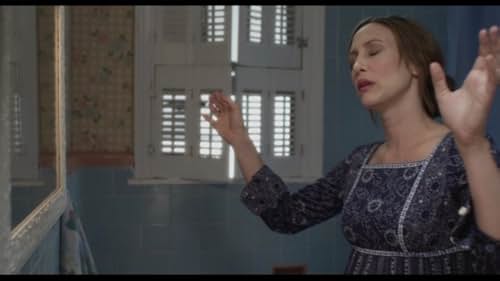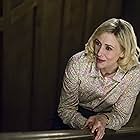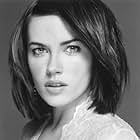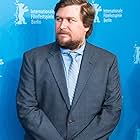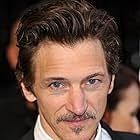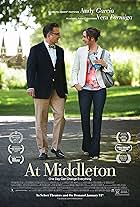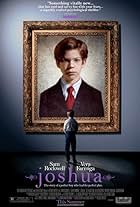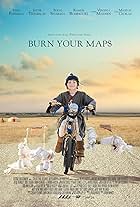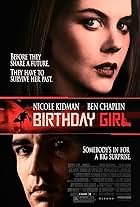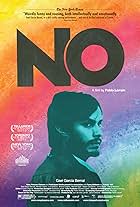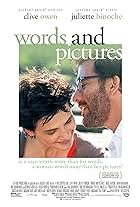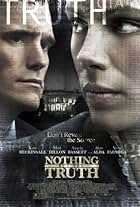IMDb RATING
6.2/10
3.3K
YOUR RATING
A chronicle of one woman's lifelong struggle with her faith.A chronicle of one woman's lifelong struggle with her faith.A chronicle of one woman's lifelong struggle with her faith.
- Awards
- 1 win & 7 nominations
Storyline
Did you know
- TriviaVera Farmiga directed this film while five months pregnant.
- GoofsVera Farmiga has blue eyes. Taissa Farmiga, the younger sister of Vera who plays the younger version of her in the movie, has brown eyes.
- ConnectionsFeatured in Maltin on Movies: Haywire (2012)
- SoundtracksBlessed Assurance
Written by Fanny Crosby and Phoebe Knapp
Arranged by Warren Haynes
Performed by Warren Haynes, Amy Helm, Molly Hawkey and MacHan Taylor
Featured review
Higher ground is one the finest films on its subject ever made, as well as one of the best films this year. Surprisingly, it's the directorial debut of one of our finest actors, Vera Farmiga. She's been very good in every film in which she's played any role, but is probably best known for her Oscar nominated turn in Jason Reitman's Up in the Air, opposite George Clooney. But for her own film, Farmiga has chosen a very difficult subject – one woman's struggle with her faith; her tenuous relationship with her husband inside a strictly defined religious community; and most important, her personal relationship with God.
The story covers the three-decade spiritual journey (late '50s through '70s) of Corinne, played as a little girl by McKensie Turner, as a teenager by Farmiga's younger sister, Taissa, and as a grown woman by Farmiga herself, in a performance that is brave, nuanced, and emotionally powerful. Hollywood films on this subject can either preach to the choir or have a contemptuous agenda, but Farmiga's film isn't about whether this or that religion is good or bad. It's about faith, and doubt, and finding one's way in life. In fact, this is the best work on the subject since Meryl Streep dazzled us in "Doubt." Here's how it goes: As a little girl, Corinne's pastor shows her how to invite Jesus into her heart, an idea that appeals to her since her home life is marred by a drunken father (John Hawkes) and a mother who has eyes for other men (Donna Murphy). But Corinne doesn't quite know what she's supposed to feel. She does like animals, and she also gives an accordion a try, when a door-to-door salesman pitches one to the family. Corinne's mother says, "She's not musical," to which the salesman quickly replies, "Maybe she hasn't found her instrument yet." This foreshadows Corrine's struggle to find her path to God.
Corinne is intellectually curious and has a talent for writing, and when a young guitarist asks her to write a song with him, she finds herself doing what so many teenagers have done before, and then pregnancy and a wedding follow. Corinne must then put her dreams of a writing career on hold, as she cares for the baby while her husband plays in a rock band. But a near tragic experience convinces them they need to give up this reckless life and join an evangelical Christian church. Corinne wants very badly to feel the Spirit, and to be happy with her husband in this religious community, but she doesn't feel what her pastor preaches, nor what she sees other members feeling. This is both a puzzlement and a torment to her, especially when she makes a good friend, Annika, played wonderfully by Dagmara Dominczyk, to whom loving and feeling God come easily.
This particular Christian community will be one many people recognize; they adhere to the bible's word and are happy to follow a strict patriarchal discipline. As a director, Farmiga does not judge, but those who do not subscribe to this type of religious practice may, and that would be a mistake. These are not bad people, they have chosen a life that works for them; it just may not be a good fit for Corinne. She's smart, studies the bible along with many other books, and she feels she has something valuable to share with the congregation. But when she speaks up, she's admonished by the pastor's wife for "coming very close to preaching and attempting to teach the men." She chafes under this restraint, which seems unreasonable to her. And then a second, very real, tragedy strikes, turning her struggle into a spiritual crisis. I think many people will recognize precisely this experience from their own lives: it is very real.
Farmiga's film does not hurry, the story unfolds slowly, and it also contains a fair amount of humor. I could've died laughing during a scene in which Corinne's marriage counselor tells her about "a dire MacMuffin moment," but it was no laughing matter. There are also many small everyday family scenes that may not seem of much consequence, but every piece of the story is important, so watch and listen carefully, as everything builds to one of the most emotionally powerful endings of any film this year. At the climax, Corinne speaks to the congregation, from her heart, a heart that perhaps gives too much, and also with a mind trying very hard to make sense of what it means to walk "The Higher Ground." In the end, we get a sense that Corinne will find her instrument, and that she will go on to make music with God.
Higher Ground is an excellent film and a brilliant directorial debut by Vera Farmiga, from whom I think we can expect great things in the future. I highly recommend it to all who appreciate literary quality stories that deal honestly with human feelings and relationships.
The story covers the three-decade spiritual journey (late '50s through '70s) of Corinne, played as a little girl by McKensie Turner, as a teenager by Farmiga's younger sister, Taissa, and as a grown woman by Farmiga herself, in a performance that is brave, nuanced, and emotionally powerful. Hollywood films on this subject can either preach to the choir or have a contemptuous agenda, but Farmiga's film isn't about whether this or that religion is good or bad. It's about faith, and doubt, and finding one's way in life. In fact, this is the best work on the subject since Meryl Streep dazzled us in "Doubt." Here's how it goes: As a little girl, Corinne's pastor shows her how to invite Jesus into her heart, an idea that appeals to her since her home life is marred by a drunken father (John Hawkes) and a mother who has eyes for other men (Donna Murphy). But Corinne doesn't quite know what she's supposed to feel. She does like animals, and she also gives an accordion a try, when a door-to-door salesman pitches one to the family. Corinne's mother says, "She's not musical," to which the salesman quickly replies, "Maybe she hasn't found her instrument yet." This foreshadows Corrine's struggle to find her path to God.
Corinne is intellectually curious and has a talent for writing, and when a young guitarist asks her to write a song with him, she finds herself doing what so many teenagers have done before, and then pregnancy and a wedding follow. Corinne must then put her dreams of a writing career on hold, as she cares for the baby while her husband plays in a rock band. But a near tragic experience convinces them they need to give up this reckless life and join an evangelical Christian church. Corinne wants very badly to feel the Spirit, and to be happy with her husband in this religious community, but she doesn't feel what her pastor preaches, nor what she sees other members feeling. This is both a puzzlement and a torment to her, especially when she makes a good friend, Annika, played wonderfully by Dagmara Dominczyk, to whom loving and feeling God come easily.
This particular Christian community will be one many people recognize; they adhere to the bible's word and are happy to follow a strict patriarchal discipline. As a director, Farmiga does not judge, but those who do not subscribe to this type of religious practice may, and that would be a mistake. These are not bad people, they have chosen a life that works for them; it just may not be a good fit for Corinne. She's smart, studies the bible along with many other books, and she feels she has something valuable to share with the congregation. But when she speaks up, she's admonished by the pastor's wife for "coming very close to preaching and attempting to teach the men." She chafes under this restraint, which seems unreasonable to her. And then a second, very real, tragedy strikes, turning her struggle into a spiritual crisis. I think many people will recognize precisely this experience from their own lives: it is very real.
Farmiga's film does not hurry, the story unfolds slowly, and it also contains a fair amount of humor. I could've died laughing during a scene in which Corinne's marriage counselor tells her about "a dire MacMuffin moment," but it was no laughing matter. There are also many small everyday family scenes that may not seem of much consequence, but every piece of the story is important, so watch and listen carefully, as everything builds to one of the most emotionally powerful endings of any film this year. At the climax, Corinne speaks to the congregation, from her heart, a heart that perhaps gives too much, and also with a mind trying very hard to make sense of what it means to walk "The Higher Ground." In the end, we get a sense that Corinne will find her instrument, and that she will go on to make music with God.
Higher Ground is an excellent film and a brilliant directorial debut by Vera Farmiga, from whom I think we can expect great things in the future. I highly recommend it to all who appreciate literary quality stories that deal honestly with human feelings and relationships.
- dick-sanders
- Jan 14, 2012
- Permalink
- How long is Higher Ground?Powered by Alexa
Details
- Release date
- Country of origin
- Official site
- Language
- Also known as
- This Dark World
- Filming locations
- Production companies
- See more company credits at IMDbPro
Box office
- Budget
- $2,000,000 (estimated)
- Gross US & Canada
- $841,733
- Opening weekend US & Canada
- $21,495
- Aug 28, 2011
- Gross worldwide
- $1,043,262
- Runtime1 hour 49 minutes
- Color
- Sound mix
- Aspect ratio
- 1.85 : 1
Contribute to this page
Suggest an edit or add missing content


